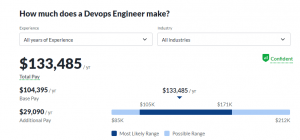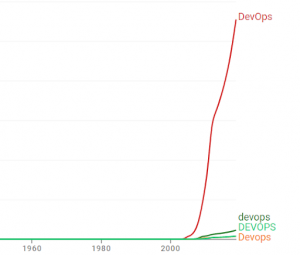DevOps enables organizations to deliver software at higher speed, scale, and quality by combining development and operations; making it more important in 2023 than ever before. Given its value additions over the typical SDE role, DevOps engineers get anywhere between 25-30% higher TC, making it increasingly popular among programmers.

(Image Credits: Glassdoor)
The global economy is facing a rough patch and many experts speculate that we might be facing recessionary pressure for quite some time. This is well reflected in the job market as it took a complete 180-degree turn from the ‘Great Resignation’ to mass layoffs.
In this article, the experts at Talent500 have outlined the top X interview questions for securing a DevOps job in 2023 with the best possible package.
Let’s get started:
65+ DevOps interview technical questions you must prepare for
The popularity of DevOps has increased exponentially ever since it was introduced and our experts have identified the most commonly asked interview questions for our readers:

(Image Credits: Google)
DevOps Fundamentals
- What is DevOps? Why is it needed in today’s scenario?
- What are the prerequisites for DevOps implementation for a tech company?
- To whom does DevOps benefit?
- What are the business benefits of implementing DevOps?
- What are the principles of DevOps?
- Name the key components of the DevOps pipeline.
- What are the different phases of DevOps?
- Which are the roles involved in DevOps?
- What are organization playbooks?
- List down the benefits of version control.
- Differentiate between centralized and distributed version control systems.
- Name the top X popular DevOps tools. How will you categorize them and why?
- Name the scripting tools used in DevOps.
- Explain the Blue and Green Deployment Patterns.
- Compare Asset Management and Configuration Management.
- Can you explain Forking Workflow?
- Enlist the methods used for making content reusable/redistributable.
- Which cloud platforms can be used for DevOps? Which is better among them?
- Enlist the top DevOps metrics from the scalability point of view.
- Is pair programming practised in DevOps?
- What is Component-Based Development (CBD)?
- Tell us about the difference between asset management and configuration management.
- What is Build with respect to DevOps?
- Tell us about the acronym CAMS with respect to DevOps.
- Discuss the core operations of DevOps in terms of development and infrastructure.
Questions related to tools used in DevOps:
Selenium-focused questions:
- What are the main issues with Selenium?
- Name the different components of Selenium.
- Tell us about exceptions in Selenium WebDriver.
- Which types of tests do Selenium support?
- Explain the use of the following functions in Selenium WebDriver:
- findElement()
- findElements()
- driver.close()
- driver.quit()
6.Discuss the role of a Selenium Grid.
Git-focused questions
- Tell us about the advantages of using Git?
- Explain branching in Git.
- Explain how you would approach merge conflicts in Git?
- Differentiate between git fetch and git pull.
- Explain the difference between ‘git rebase’ and ‘git merge’. Also, explain the scenarios where they are used.
- How to revert a bad public commit?
Jenkins-focused questions
- How to move/copy Jenkins from one server to another?
- How many types of pipelines does Jenkins have? Please explain them along with their syntax.
- Explain your approach to securing Jenkins.
- How many security mechanisms does Jenkins use? Can you turn them off in cases like administrators getting locked out of admin control?
- What is the concept of master-slave architecture in Jenkins?
Puppet-focused questions
- What do you mean by a Puppet Manifest?
- How does a Puppet Module differ from a Puppet Manifest?
- Tell me about Puppet codedir.
- Which command do you use in Puppet to sign the requested certificates?
- Are there any open-source or community tools for using Puppet more effectively? If yes, name a few.
Maven-focused questions
- What is Maven and what value does it provide to DevOps?
- Can you name the file used for defining dependency in Maven?
Ansible-focused questions
- What is Ansible?
- What do you mean by an Ansible role?
- State the differences between Ansible and Puppet.
Nagios-focused questions
- What is Nagios? Why should I use Nagios?
- Briefly explain how Nagios works.
- What do you mean by port numbers with respect to Nagios?
- Explain active and passive checks in Nagios.
- Tell me about virtualization with Nagios.
Kubernetes and Docker-focused questions
- What is kubectl?
- List the cloud platforms that support Docker.
- Should I use Docker or virtual machines? Why?
- How can I create a Docker swarm?
- Can Docker containers be shared with different nodes?
- Can I use multiple containers as a single service?
- Explain the difference between a Docker registry and a Docker repository.
Chef-focused questions
- What is Chef? Why does it use SSL certificates?
- What do you know about Test Kitchen with respect to Chef?
- Explain the difference between chef-apply and chef-client.
- What do you mean by anti-patterns?
Non-technical questions for landing a DevOps job in 2023
For soft skill questions, refer to this article on the Talent500 blog. But with the recession making things worse for everybody out there so here are a few answers to the ‘hard questions:’
Would you settle down on a lower pay than you just quoted given the recession?
While you may have to accept a TC lower than your expectations in many cases, you must negotiate on the below terms:
- Ask for the position to be made a remote if it’s not already one since it will help you cut down on transportation costs.
- Ask explicitly for considering appraisals with a higher (imaginary) payout since increments are calculated on the basis of the last drawn salary.
- Demand higher ESOP payout with relaxations on maturity period and liquidity.
- Ask the employer for more flexibility when it comes to leaving policy.
Such requests may not necessarily be met but they will surely indicate that you consider the opportunity important and that you aren’t a novice/gullible.
Given the state of the economy, why do you think that your expected TC is well justified?
During recessions, spending definitely slows down but it doesn’t mean that investments halt completely. As they say- safer bets like real estate and gold outperform commodities (unsafe bets) and over the past couple of months, I have upskilled myself in both technical and soft skills to ensure that I can deliver better value to my future organization. Hence, I believe that my willingness to deliver above and beyond makes me a safe bet in a seemingly ‘desperate’ job market.
Summing Up
Lastly, have a clear understanding of your past career trajectory and how you plan to move forward viz. vertical or horizontal, large corporation or a startup, new products or legacy products.
While interviewing for different companies can get hectic, keep yourself updated on DevOps and continue upskilling yourself
Though hiring has frozen across many tech companies, many organizations are still looking for talent to help them thrive in these testing times.
Looking for a well-paying DevOps job, join Talent500 now!






Add comment